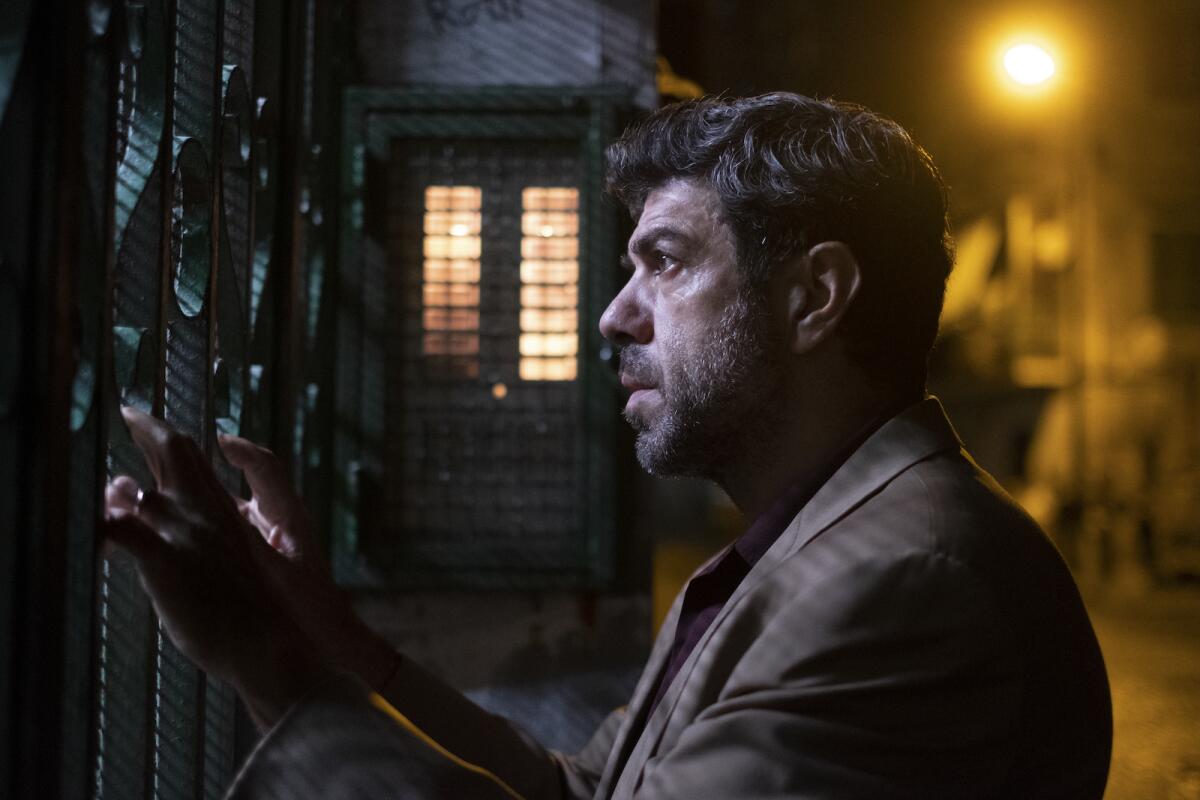Review: Stirring Italian film ‘Nostalgia’ evocatively revisits the past

- Share via
You can’t go home again. Or can you? Both things can be true at once, as evidenced by “Nostalgia,” the absorbing, finely tuned drama that was Italy’s official selection for this year’s best international film Oscar.
Prolific director Mario Martone, who co-wrote “Nostalgia” with wife Ippolita Di Majo (based on the novel by Ermanno Rea), has crafted a compelling, slow burn of a story that masterfully winds its way to a resolution that’s as avoidable as it is inevitable: a poignant journey of sadness, regret, hope and a perhaps fateful dose of naivete.
For your safety
The Times is committed to reviewing theatrical film releases during the COVID-19 pandemic. Because moviegoing carries risks during this time, we remind readers to follow health and safety guidelines as outlined by the CDC and local health officials.
The film is anchored by a beautifully sensitive, sympathetic turn by European Film Award nominee Pierfrancesco Favino (“The Traitor,” “Padrenostro”) as Felice Lasco, a 55-year-old construction boss who returns to his native Naples for the first time in 40 years.
The reflective opening scenes find Felice arriving in and exploring the city’s Sanità district, the downscale neighborhood of his youth, after decades living abroad — Lebanon, South Africa and, most recently, Egypt, where he resides with wife Arlette (Sofia Essaïdi).
It’s soon revealed that Felice is there to visit his elderly, nearly blind mother, Teresa (Aurora Quattrocchi), whom he hasn’t seen since he fled the city at age 15. (We’ll later learn the teenage Felice had been involved in a murder, soon after which an uncle protectively whisked him out of the country and taught him the building trade.)
Felice’s scenes with the gentle, loving Teresa are tender and bittersweet, especially one in which he must sponge-bathe his ill-cared-for mother. The well-off Felice also moves his fragile mom from her dank basement apartment to a larger, sunnier flat nearby. This results in another sweet moment between them, even if it will prove ephemeral.
But it’s that decades-old killing — which was perpetrated by his best friend, Oreste Spasiano (Tommaso Ragno), during one of many petty thefts the young pair committed back in the day — that still most haunts Felice. It’s a complicated event he finds himself driven to reconcile now that he’s returned to the scene of the crime, one that, at least publicly, has remained “unsolved.” The first step toward this resolution is to find and reunite with Oreste.
Here’s the rub, though: Oreste stayed in town and became the deeply feared and ruthless head of a local mob that essentially rules the Sanità area. Felice can’t just stop by Oreste’s home for a casual swing down memory lane.
Even with a few severe warning signs from Oreste’s camp for Felice to “disappear,” as well as the firm advice of busy neighborhood priest Don Luigi (Francesco Di Leva) and Teresa’s old friend, Raffaele (Nello Mascia), Felice is undeterred from tracking down Oreste (now known as O Malommo or “the Badman”). Not only that, he wants to move back to Naples with Arlette, thus remaining in Oreste’s precarious and unwelcoming orbit.
The eventual showdown between Felice and Oreste in a rundown Sanità hideaway is superbly staged and performed and infused with a palpable layer of dicey tension. The way the cruel, unkempt Oreste can barely look his ex-blood brother in the eye, despite Felice’s measured appeal to leave the past behind (and, with it, any incriminating revelations about that erstwhile murder), speaks volumes about their relationship’s future, despite how the hopeful Felice may see it.
The Naples-born Martone, also an accomplished stage and opera director, has featured his native turf in such films as “Death of a Neapolitan Mathematician,” “The Mayor of Rione Sanità” and “The King of Laughter.” Working here with cinematographer Paolo Carnera, he paints a gritty, well-worn yet strangely intimate portrait of the ancient city, which often feels like a character itself. Super 8-formatted flashbacks of the young and unbridled Felice and Oreste (played as teens by Emanuele Palumbo and Artem, respectively) provide an exuberant contrast to the more pensive or brooding present-day scenes, while also confirming our belief in the pair’s original bond.
If yielding to nostalgia often makes people recall a more affectionate and wistful version of what actually was, this stirring, evocative film likely will leave viewers haunted by what might have been.
'Nostalgia'
In Italian and Arabic with English subtitles
Not rated
Running time: 1 hours, 58 minutes
Playing: Laemmle NoHo 7, North Hollywood; available Feb. 21 on VOD
More to Read
Only good movies
Get the Indie Focus newsletter, Mark Olsen's weekly guide to the world of cinema.
You may occasionally receive promotional content from the Los Angeles Times.










